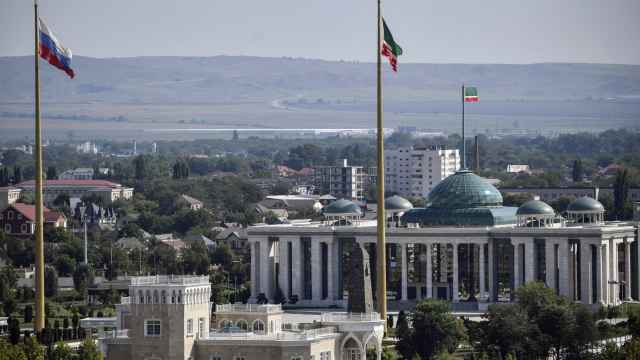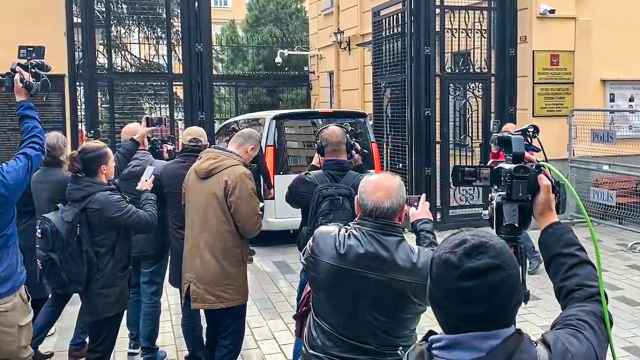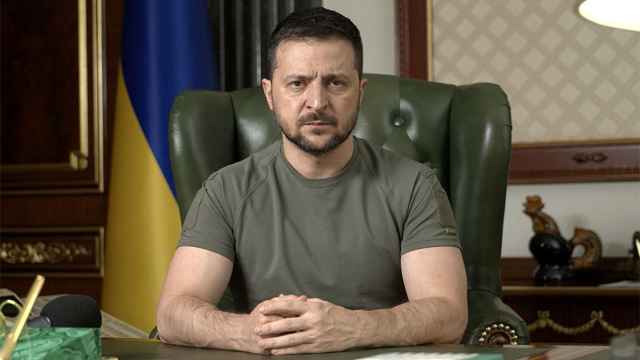Paul the Octopus correctly predicted the outcomes of a surprising number of games in the 2010 FIFA World Cup. Likewise, the weekly magazine Odnako — whose editor-in chief is Mikhail Leontyev, an outspoken conservative who supports a strong Russian state — has made some very accurate predictions concerning events in Russia.
The May issue of the magazine was devoted to the government's policy on culture and featured an interview with historian and United Russia member Vladimir Medinsky. The heading, "A unified approach to history is either defined by the state or by whoever is handy," gives an idea of the substance of that piece. After reading it, I correctly guessed that these were the words of the country's next culture minister. In this capacity, Medinsky last week asked NTV management not to show what he considers a highly controversial film, "I Serve the Soviet Union," on June 22 — the day marking the Nazi invasion of the Soviet Union in 1941 — because it might offend veterans.
This is important for two reasons: one, because the state took such a strong public position on an issue so central to Russia's self-identity, and two, because Medinsky's position is in line with the historical and moral sentiments of most Russians.
For proof of this, consider "The Historical Process" program on Rossia-1 that aired on May 16 and was devoted to the Great Patriotic War. Viewers were asked to vote for either liberal television host Nikolai Svanidze, who emphasized the mistakes and crimes committed by Josef Stalin, or for Dmitry Kiselyov, a colleague of Medinsky's who argued that it was a great victory achieved by both the state and society at a huge cost and sacrifice. Kiselyov received more than four times as many votes as Svanidze. Similarly, more than 90 percent of the posts on Prime Minister Dmitry Medvedev's blog on the media call for introducing morality-based censorship of television programming.
Another example was the April issue of Odnako, which argued that Russia's accession to the World Trade Organization was in direct contradiction of President Vladimir Putin's stated goal of re-industrialization. The reason given was that every example of successful industrialization — from the victory of the Union states over the Confederate states in the U.S. Civil War to the economic miracles in Japan, South Korea and Taiwan — resulted from a country's policy of strict protectionism and an active state role in developing and controlling key sectors. Odnako's editors correctly point out that it would be awkward to decline on membership in the WTO after nearly 20 years of negotiations, but this can't be ruled out.
Then on June 20, State Duma deputies from the Communist Party and A Just Russia sent a formal request to the Constitutional Court to review on procedural grounds the legality of Russia's accession to the WTO. Both parties believe that WTO accession would be detrimental to Russia's economy.
If Putin does not go too far in opposing the initiative, he might even reach agreement with the Communist Party and A Just Russia, both of which could be key allies for his policy of re-industrialization and greater economic and political integration with the former Soviet republics. Political analyst Boris Kagarlitsky once remarked that Putin is similar to a Hamlet-like split personality in that his electorate is mostly left-leaning and socially conservative, while he pursues liberal economic and social policies.
Can the new Putin make a historical choice in favor of his electorate? Follow the predictions in Odnako magazine for the answer.
Alexei Pankin is the editor of WAN-IFRA-GIPP Magazine for publishing business professionals.
A Message from The Moscow Times:
Dear readers,
We are facing unprecedented challenges. Russia's Prosecutor General's Office has designated The Moscow Times as an "undesirable" organization, criminalizing our work and putting our staff at risk of prosecution. This follows our earlier unjust labeling as a "foreign agent."
These actions are direct attempts to silence independent journalism in Russia. The authorities claim our work "discredits the decisions of the Russian leadership." We see things differently: we strive to provide accurate, unbiased reporting on Russia.
We, the journalists of The Moscow Times, refuse to be silenced. But to continue our work, we need your help.
Your support, no matter how small, makes a world of difference. If you can, please support us monthly starting from just $2. It's quick to set up, and every contribution makes a significant impact.
By supporting The Moscow Times, you're defending open, independent journalism in the face of repression. Thank you for standing with us.
Remind me later.





